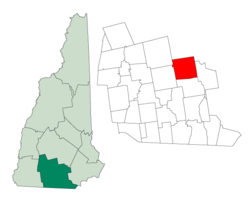Goffstown
| Goffstown, New Hampshire | ||
|---|---|---|
| Town | ||
|
||
 Location in Hillsborough County, New Hampshire |
||
| Coordinates: 43°01′13″N 71°36′01″W / 43.02028°N 71.60028°WCoordinates: 43°01′13″N 71°36′01″W / 43.02028°N 71.60028°W | ||
| Country | United States | |
| State | New Hampshire | |
| County | Hillsborough | |
| Incorporated | 1761 | |
| Government | ||
| • Board of Selectmen | Mark Lemay, Chair Collis Adams John "Allen" Brown Peter Georgantas David Pierce |
|
| • Town Administrator | Adam Jacobs | |
| Area | ||
| • Total | 37.5 sq mi (97.2 km2) | |
| • Land | 36.9 sq mi (95.5 km2) | |
| • Water | 0.6 sq mi (1.6 km2) 1.65% | |
| Elevation | 308 ft (94 m) | |
| Population (2010) | ||
| • Total | 17,651 | |
| Time zone | EST (UTC-05) | |
| • Summer (DST) | EDT (UTC-04) (UTC) | |
| ZIP code | 03045 | |
| Area code(s) | 603 | |
| FIPS code | 33-29860 | |
| GNIS feature ID | 0873606 | |
| Website | www |
|
Goffstown is a town in Hillsborough County, New Hampshire, United States. The population was 17,651 at the 2010 census. The compact center of town, where 3,196 people resided at the 2010 census, is defined by the U.S. Census Bureau as the Goffstown census-designated place and is located at the junction of New Hampshire routes 114 and 13. Goffstown also includes the villages of Grasmere and Pinardville. The town is home to Saint Anselm College (and its New Hampshire Institute of Politics) and the New Hampshire State Prison for Women.
Prior to the arrival of English colonists, the area had been inhabited for thousands of years by succeeding cultures of Native Americans; its waterways had numerous fish and the area had game.
The town was first granted as "Narragansett No. 4" in 1734 by New Hampshire and Massachusetts Colonial Governor Jonathan Belcher as a Massachusetts township (the area then being disputed between the two provinces). It was one of seven townships intended for soldiers (or their heirs) who had fought in the "Narragansett War" of 1675, also known as King Philip's War. In 1735, however, some grantees "found it so poor and barren as to be altogether incapable of making settlements," and were instead granted a tract in Greenwich, Massachusetts.
The community would be called "Piscataquog Village" and "Shovestown" before being regranted by Masonian proprietor Governor Benning Wentworth in 1748 to new settlers. These included Rev. Thomas Parker of Dracut and Colonel John Goffe, for whom the town was named. He was for several years a resident of Bedford, and the first judge of probate in the county of Hillsborough. Goffstown was incorporated June 16, 1761. A large part of the town was originally covered with valuable timber. Lumbering and fishing were the main occupations of the early settlers. The village of Grasmere was named for Grasmere, England, home of the poets William Wordsworth and Samuel Taylor Coleridge.
...
Wikipedia

